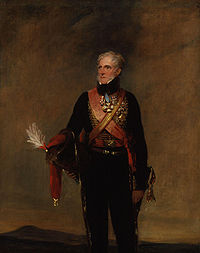Henry William Paget, 1st Marquess of Anglesey
|
Field Marshal The Most Honourable The Marquess of Anglesey KG, GCB, GCH, PC |
|
|---|---|
 |
|
| Lord Lieutenant of Ireland | |
|
In office 27 February 1828 – 22 January 1829 |
|
| Monarch | George IV |
| Prime Minister | The Duke of Wellington |
| Preceded by | The Marquess Wellesley |
| Succeeded by | The Duke of Northumberland |
|
In office 4 December 1830 – 12 September 1833 |
|
| Monarch | William IV |
| Prime Minister | The Earl Grey |
| Preceded by | The Duke of Northumberland |
| Succeeded by | The Marquess Wellesley |
| Personal details | |
| Born |
17 May 1768 London |
| Died | 29 April 1854 (aged 85) Uxbridge House, London |
| Nationality | British |
| Political party |
Whig Tory |
| Spouse(s) | (1) Lady Caroline Villiers (1774–1835) (divorced 1810) (2) Lady Charlotte Cadogan (1781–1853) |
| Alma mater | Christ Church, Oxford |
| Military service | |
| Allegiance |
|
| Service/branch |
|
| Years of service | 1793–1854 |
| Rank | Field Marshal |
| Commands | 7th Light Dragoons |
| Battles/wars | Napoleonic Wars |
| Awards |
Knight of the Order of the Garter Knight Grand Cross of the Order of the Bath Knight Grand Cross of the Royal Guelphic Order |
Field Marshal Henry William Paget, 1st Marquess of Anglesey, KG, GCB, GCH, PC (17 May 1768 – 29 April 1854), styled Lord Paget between 1784 and 1812 and known as the Earl of Uxbridge between 1812 and 1815, was a British Army officer and politician. After serving as a Member of Parliament for Carnarvon and then for Milborne Port, he took part in the Flanders Campaign and then commanded the cavalry for Sir John Moore's army in Spain during the Peninsular War; his cavalry showed distinct superiority over their French counterparts at the Battle of Sahagún, where his men captured two French lieutenant colonels and so mauled the French chasseurs that they ceased to exist as a viable regiment. He also commanded the cavalry at the Battle of Benavente, where he defeated the elite chasseurs of the French Imperial Guard.
During the Hundred Days he led the charge of the heavy cavalry against Comte d'Erlon's column at the Battle of Waterloo. At the end of the battle he lost part of one of his legs to a cannonball, leading to a famous brief exchange of words with Wellington. In later life he served twice as Master-General of the Ordnance and twice as Lord Lieutenant of Ireland.
...
Wikipedia
